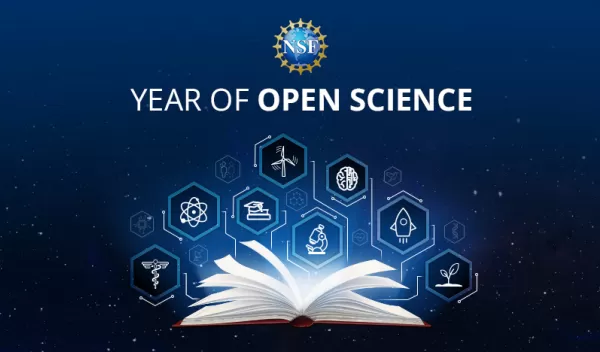
NSF funds 12 projects to advance open and equitable research in the geosciences
The U.S. National Science Foundation is investing $10.4 million to advance open and equitable research in the geosciences, in alignment with the goals of the federal 2023 Year of Open Science. Through its new Geosciences Open Science Ecosystem (GEO OSE) program, NSF is funding 12 new projects to support sustainable and networked open science activities. The program will foster an ecosystem of inclusive access to data, physical collections, software, advanced computing and other resources toward advancing research and education in the geosciences. The GEO OSE program in the newly created Division of Research, Innovation, Synergies, and Education (RISE) in NSF's Directorate for Geosciences leverages expanding information resources and computing capabilities to address interdisciplinary grand challenge research questions at the forefront of the geosciences.
NSF is supporting two tracks of GEO OSE projects that acknowledge the range of readiness levels across the geosciences. Six projects in Track 1 will advance early-stage GEO OSE activities, including two-year projects to develop pilot capabilities or community-building activities. These awards have the potential to guide the future design, development and deployment of GEO OSE resources. Six projects in Track 2 will advance larger-scale activities aimed at providing an accessible and sustainable ecosystem of GEO OSE resources. All 12 projects facilitate broad stakeholder involvement and address community-driven open science needs in the geosciences — major goals of the new RISE Division. Four of the projects utilize commercial cloud computing resources through the NSF CloudBank facility, which simplifies cloud access for research and education.
The 12 projects are:
Track 1
Enhancing the Accessibility of Novel Geostatistical Inversion Workflows for Cryosphere Research
Led by the University of Florida, this project will create and share freely available geostatistical software to make it easier for researchers to create maps of topography beneath glaciers and ice sheets developed from big data sets.
Led by the University of Colorado Boulder, the Smithsonian Institution and Arizona State University, this project will improve discovery and use of millions of fossil specimen records for paleontology research. This project is jointly supported by RISE and the Infrastructure Capacity for Biological Research program in NSF’s Directorate for Biological Sciences.
Facilitating Reproducible Open GeoScience
Led by the University of Southern California and Northern Arizona University, this project will lead a series of workshops to provide training on the use of open-source tools and to catalyze open, reproducible and replicable practices among geoscientists. This project is jointly supported by RISE and NSF's Office of Integrative Activities.
Led by Vanderbilt University, the University of Washington and Woods Hole Oceanographic Institution, this project will build an open cloud computing platform and cloud-deployed software package to enable broad access to glacial modeling within a high-performance computing environment. This project is jointly supported by RISE and NSF’s Office of Advanced Cyberinfrastructure (OAC) in support of a National Discovery Cloud for Climate (NDC-C).
SUNCAST: Software Unified Collaboration for Advancing Solar Tomography
Led by the New Jersey Institute of Technology, this project will develop a user-friendly, open-source software framework for data analysis and modeling on the solar corona, which will inform understanding of the sun and its impact on the Earth.
Transforming Volcanology Towards Open Science in the Cloud With VICTOR
Led by Columbia University, the University of South Florida and Tufts University, this project will continue the development and expansion of the Volcanology Infrastructure for Computational Tools and Resources project, which provides a platform for executing numerical simulations of volcanic processes.
Track 2
Led by the University at Albany, the University Corporation for Atmospheric Research and Code for Science and Society/2i2c, this project will advance the development and use of Pythia Cookbooks, which are web-based interactive computing platforms embedded in open, cloud-based computational environments for executing common geoscience workflows.
Led by the University of Alaska Fairbanks, this project will increase the accessibility and usability of PISM for glaciology and sea-level research. This work includes cloud-based deployment of PISM and training workshops to support user adoption. This project is jointly supported by RISE and NSF's OAC in support of an NDC-C.
QGreenland-Net: Open, connected Data Infrastructure for Greenland-focused Geoscience, and Beyond
Led by the University of Colorado Boulder and the University of California, Santa Barbara, this project will develop QGreenland-Net, a cloud-based geospatial data infrastructure for Greenland-focused research and education. This project is jointly supported by RISE and NSF's OAC in support of an NDC-C.
Sustainable Open Science Tools to Democratize Use of 3D Geomaterial Data
Led by The University of Texas at Austin and Virginia Tech, this project will create cloud-based open science tools for curation and analysis of geomaterial image data. This project is jointly supported by RISE and the Division of Chemical, Bioengineering, Environmental and Transport Systems in NSF’s Directorate for Engineering.
Led by the University of Kansas, the University of Wisconsin–Madison, Texas A&M University, the University California, Santa Cruz, the University of Washington and Northern Arizona University, this project will build tools to enable collaborative workflows for collecting and interpreting field- and laboratory-based geological data via the existing StraboSpot data system. Tool development will be guided by the community workflow needs of cross-disciplinary subduction zone science.
Led by the University of Wisconsin–Madison and the University of Kansas, this project will integrate the existing StraboSpot and Macrostrat data systems to support streamlined user workflows for data capture and development of geologic maps toward creation of integrated models of Earth's crust.
